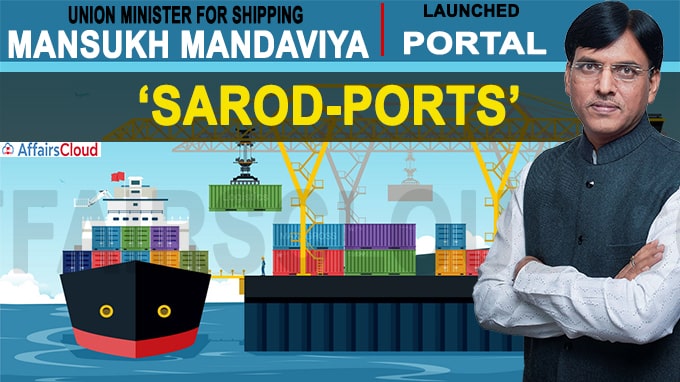 On September 10, 2020 Mansukh Laxmanbhai(L.) Mandaviya, Union Minister of State for Shipping (I/C) launched a dispute resolution mechanism, ‘SAROD-Ports’ (Society for Affordable Redressal of Disputes – Ports) through virtual ceremony in New Delhi, India. It was established under the Societies Registration Act, 1860. It consists of members from Indian Ports Association (IPA) and Indian Private Ports and Terminals Association (IPTTA).
On September 10, 2020 Mansukh Laxmanbhai(L.) Mandaviya, Union Minister of State for Shipping (I/C) launched a dispute resolution mechanism, ‘SAROD-Ports’ (Society for Affordable Redressal of Disputes – Ports) through virtual ceremony in New Delhi, India. It was established under the Societies Registration Act, 1860. It consists of members from Indian Ports Association (IPA) and Indian Private Ports and Terminals Association (IPTTA).
Gist About ‘SAROD-Ports’
Objective
To fairly resolve disputes in an affordable and timely manner, i.e., will save a huge amount of legal expenditure and time.
To enrich the dispute redressal mechanism with the panel of technical experts as arbitrators.
Note– Due to its quick, timely, cost effective and robust dispute resolution mechanism, it will make it easier to do business in the maritime sector
Alike the provision available in Highway Sector
It is similar to the provision available in the form of SAROD-Roads constituted by NHAI(National Highways Authority of India) in the Highway Sector
Disputes to be resolved
i.It will advise and assist in resolving disputes through arbitrations in the maritime sector, including ports and shipping sector in Major Port Trusts, Non-major Ports, including private ports, jetties, terminals and harbours.
ii.Apart from them, it will also cover the disputes between Licensee/Concessionaire and their contractors arising out of and during the course of execution of various contracts and disputes between granting authority and Licensee/Concessionaire /Contractor.
Background
In January 2018, the Union Cabinet chaired by Prime Minister Narendra Modi approved amendments in the Model Concession Agreement (MCA).
The amendments in the MCA anticipated the constitution of SAROD-PORTS as a dispute resolution mechanism for PPP(Public-Private Partnership) Projects in the Major Ports.
Additional Info
i.In the coming days, all major Ports will shift towards ‘Landlord Model. Many concessioners will be working with the Major Ports.
ii.SAROD-Ports will promote confidence in private players and ensure the right kind of environment for the partners.
About Societies Registration Act of 1860:
It was enacted under the British Raj in India. The legislation in India allows the registration of entities involved in the benefit of society – education, health, employment etc.
It provides for the registration of literary, scientific and charitable societies.
About Model Concession Agreement (MCA):
It forms the core of public private partnership (PPP) projects in India. It frames the policy and regulatory framework for implementation of a PPP project. The 1st version of MCA was developed by the Planning Commission.
- It addresses a range of critical issues pertaining to a PPP framework. It allocates risk to parties best suited to manage them
- MCA’s for various sectors like National Highways, State Highways, Urban Rail Transit System and Ports are available.
Recent Related News:
On April 30, 2020 The Ministry of Shipping launched its reconstructed website (shipmin.gov.in), which is based on open source technology and is deployed on the National Informatics Centre(NIC) cloud Meghraj.
It is designed in accordance with the Guidelines for Indian Government Websites (GIGW) issued by the Department of Administrative Reforms and Public Grievances, Government of India(GOI)
Constituency:
Mansukh L. Mandaviya– Rajya Sabha, Gujarat




